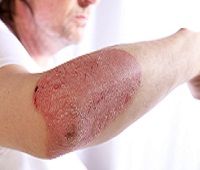Article
Researchers Discover Genetic Differences Between Cutaneous Psoriasis and Psoriatic Arthritis
Author(s):
A recent study revealed the pathogenic similarities and differences between cutaneous psoriasis and psoriatic arthritis.

A recent study revealed the pathogenic similarities and differences between cutaneous psoriasis and psoriatic arthritis.
To distinguish themselves from prior researchers in this field, James T. Elder, MD, PhD, and Kirk D. Wuepper, MD, professor of molecular genetic dermatology, department of dermatology, University of Michigan, Ann Arbor, analyzed thousands of people based on two disease definitions.
Elder, Wuepper, and their team established clear definitions for the two conditions: cutaneous psoriasis was used to describe an individual who suffered from the disease for at least a decade (at the time of study enrollment) without having developed any joint complaints. Whereas, psoriatic arthritis, described patients who were already afflicted with psoriasis, and later developed arthritis caused by their psoriasis.
Studying the small differences between the frequencies of alleles opened the door to better understanding of genetic variations.
According to Elder, “The major effect has to do with genes in a region of the genome, or chromosome 6, that’s called the Major Histocompatibility Complex (MHC). It contains about 200 genes. About six of them, called HLA genes are particularly important in individualizing each person’s immune response.”
The researchers found approximately a quarter of psoriasis patients later develop psoriatic arthritis. The team understands the next steps would be to aid doctors in discerning which psoriasis patients would ultimately also suffer from arthritis.
The development is integral as it could help physicians pursue more intensive targeted therapies.



